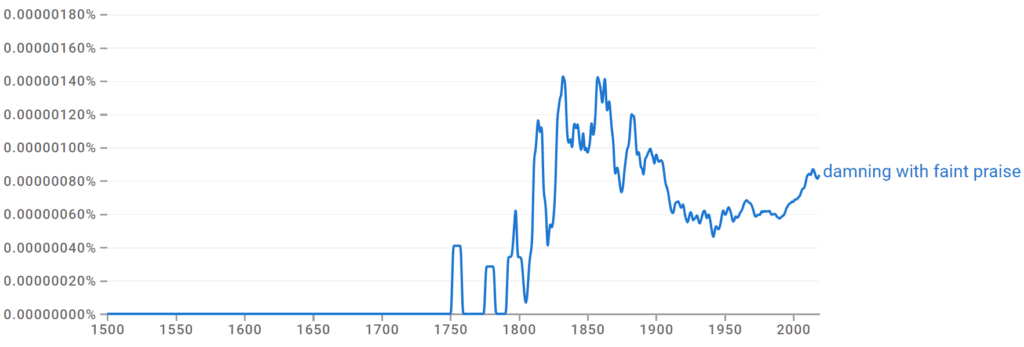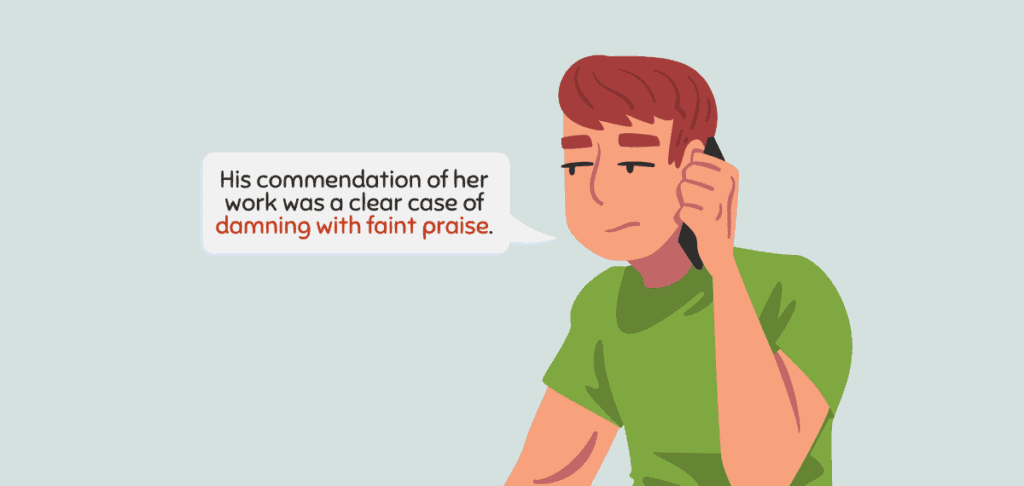Today I’m pulling all the details on a phrase that’s as subtly sardonic as they come — damning with faint praise. Warning, this one’s a real tongue twister. If you want to learn more about this expression, then let’s get down to business and find out what it means to damn with faint praise.
What Does the Expression Damning With Faint Praise Mean?

To damn with faint praise is to criticize or belittle someone or something by giving a seemingly positive but actually insincere or half-hearted compliment.
In essence, it’s just a sophisticated way of throwing shade at someone — delivering a backhanded compliment or underhanded criticism. It’s more about what’s not said or how it’s said rather than the words themselves.
Origin and Etymology of Damning With Faint Praise

The phrase damning with faint praise seemingly hails from the 18th-century literary world. The English poet Alexander Pope coined it in his satirical poem, “Epistle to Doctor Arbuthnot,” in 1723. Pope used it to criticize his contemporary writers, who used faint or weak praise to subtly condemn others.
But the idea of damning with faint praise was first put forward by the Roman author Favorinus in A.D. 110, who stated that receiving a feeble compliment is worse than receiving severe criticism.
Nowadays, it’s not a super common idiomatic phrase, but it is in use, and we apply it to all sorts of situations where you want to talk trash about someone in a passive-aggressive way.
Damning With Faint Praise Synonyms
Of course, you can embody this idea in several other ways. Try switching things up and using some of these alternative phrases.
- Backhanded compliment
- Left-handed compliment
- Insincere praise
- Veiled criticism
- Passive-aggressive compliment
Damn With Faint Praise Sentences

This one’s tricky to imagine in a sentence, so here’s a list of complete sentences showing you how to use it.
- His comment on my presentation was a classic case of damning with faint praise. He said it was interesting with a blasé tone.
- She damned his cooking with faint praise, describing it as unique.
- The manager is an expert at damning with faint praise, which is why his critiques sting.
- He damned her painting with faint praise by saying it was “colorful.”
- “Your outfit is… different,” she said, damning with faint praise.
- The review was damning with faint praise, calling the book “readable.”
- His commendation of her work was a clear case of damning with faint praise.
- The teacher damned my project with faint praise by calling it “creative.”
- “Your singing is certainly distinctive,” he commented with a cringe, damning her performance with faint praise.
- The boss damned the team’s efforts with faint praise, describing the result as “adequate.”
That’s a Wrap
And there you have it, damning with faint praise — a wordy testament to the power of subtly and sarcasm. Who knew an 18th-century poem would give us such a punchy phrase? Whenever you come across a half-hearted compliment, you’ll know exactly what’s going on. Stick around and check out my other idiomatic breakdowns right on our site!
Related Articles:
